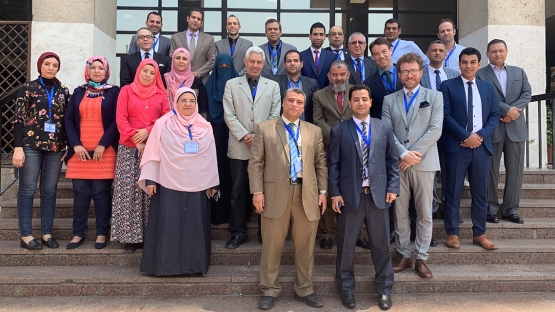A national workshop on the international legal instruments for the safe, secure and peaceful use of nuclear energy was held in Cairo from 8 to 11 July to raise awareness of government officials on the importance of adherence to and effective implementation of the instruments in the areas of safety, security, safeguards and civil liability for nuclear damage.
The workshop was organized as part of the IAEA’s ongoing cooperation with Egypt, for representatives of the Nuclear Power Plants Authority (NPPA), the Egyptian Nuclear and Radiological Regulatory Authority (ENRRA) and other stakeholders from relevant ministries and institutions.
NPPA Technical Advisor Khalil Yasso welcomed the event organized by the IAEA in collaboration with the NPPA, highlighting that Egypt is already “party to some of the international legal instruments such as the Treaty on the Non-Proliferation of Nuclear Weapons, the Vienna Convention on Civil Liability for Nuclear Damage, the Joint Protocol Relating to the Application of the Vienna Convention and Paris Convention, the Convention of Early Notification of a Nuclear Accident and the Convention on Assistance in the Case of a Nuclear Accident or Radiological Emergency. This seminar is important in raising our understanding of these and the other instruments, as we continue to work towards introducing nuclear power.”
Anthony Wetherall from the IAEA Office of Legal Affairs, who led the workshop, highlighted that “adherence to and effective implementation of the international legal instruments including through the adoption of comprehensive national nuclear legislation are important steps on the path to launching a successful nuclear power programme”.
During the seminar, lawyers and other officials from relevant ministries and institutions were informed about the various areas of nuclear law and the related international legal instruments through presentations by IAEA staff and experts and discussions on topics such as regulatory independence, radiation protection, radioactive waste management, emergency preparedness and response, nuclear security and civil liability for nuclear damage. Egypt is not yet party to the Convention on Nuclear Safety (although it is a signatory state), the Joint Convention on the Safety of Spent Fuel Management and on the Safety of Radioactive Waste Management and the Convention on the Physical Protection of Nuclear Material (CPPNM) and the Amendment thereto.
“This national workshop has come at a good time,” Yasso said. “The practical case studies delivered during the event were very useful in broadening our understanding of the right and obligations stemming from the international legal instruments. We look forward to the IAEA’s continued support in this regard.”
The workshop, implemented in the framework of the IAEA’s legislative assistance programme, is one of many activities conducted under the Agency’s technical cooperation programme to support Member States in establishing and enhancing their national legal frameworks.
In March this year, the NPPA received a site approval permit for the El Dabaa site from national regulatory body, ENRRA. Four VVER-1200 pressurised water reactors are planned for El Dabaa. Russian State Atomic Energy Corporation Rosatom is to develop the plant, which will be operated by the NPPA. An IAEA Integrated Nuclear Infrastructure Review (INIR) mission is scheduled for October this year upon request of the Egyptian Government.





